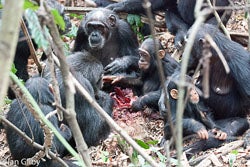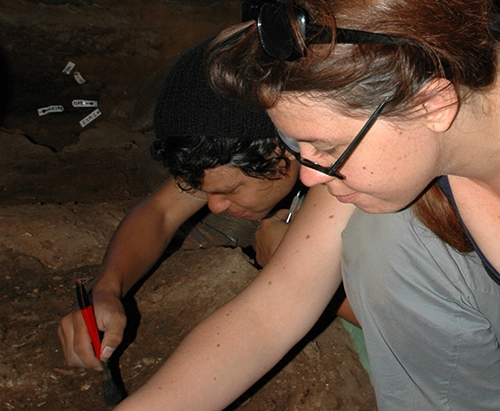Chimps on the hunt
 It’s a calm day in the forest. A group of colobus monkeys are chewing on their lunch. They jump from tree to tree to find the tastiest leaves. Suddenly, the air is filled with high-pitched chirps and squeaks—alarm calls! A group of chimpanzees has appeared below the monkeys’ tree. One of the chimps starts climbing up the tree. The monkeys scatter. Most of them escape, but one isn’t so lucky. This monkey is now lunch for the chimpanzees.
It’s a calm day in the forest. A group of colobus monkeys are chewing on their lunch. They jump from tree to tree to find the tastiest leaves. Suddenly, the air is filled with high-pitched chirps and squeaks—alarm calls! A group of chimpanzees has appeared below the monkeys’ tree. One of the chimps starts climbing up the tree. The monkeys scatter. Most of them escape, but one isn’t so lucky. This monkey is now lunch for the chimpanzees.
Researchers used to think that humans were the only primates that were violent. When Jane Goodall went to study chimpanzees at Gombe, she learned that this wasn’t true. Like humans, chimpanzees hunt other animals and even go to war with other chimp groups. Today, researchers study how chimpanzees cooperate with each other during hunting and other activities.
Humans and chimpanzees both hunt animals for meat. Meat provides important nutrients for chimps that are rare in plants. A little meat can go a long way. This means that individuals will cooperate during hunting to improve their own chances of getting meat.
 Chimps use information about many things to decide when to cooperate: What is the forest like? How hard will it be to follow the monkeys? Can I catch one on my own? How much energy do I have? Who else is in my group? Are they good hunters?
Chimps use information about many things to decide when to cooperate: What is the forest like? How hard will it be to follow the monkeys? Can I catch one on my own? How much energy do I have? Who else is in my group? Are they good hunters?
Even when a chimp catches a monkey, he doesn’t always like to share. Other chimps have to beg and harass him to share. Finally, he will give them some meat just to be left alone.
In the end, chimpanzees hunt for selfish reasons, and they don’t always like to share. But they still know to work together.
Gilby, I. C. (2006). Meat sharing among the Gombe chimpanzees: Harassment and reciprocal exchange. Animal Behaviour, 71(4), 953–963. doi:10.1016/j.anbehav.2005.09.009
Gilby, I. C., Eberly, L. E., & Wrangham, R. W. (2008). Economic profitability of social predation among wild chimpanzees: Individual variation promotes cooperation. Animal Behaviour, 75(2), 351–360.
What is it like to be an anthropologist in the field?
Answer »









